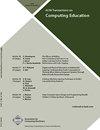Relationship Between Implicit Intelligence Beliefs and Maladaptive Self-Regulation of Learning
IF 3.2
3区 工程技术
Q1 EDUCATION, SCIENTIFIC DISCIPLINES
引用次数: 1
Abstract
Objectives. Although prior research has uncovered shifts in computer science (CS) students’ implicit beliefs about the nature of their intelligence across time, little research has investigated the factors contributing to these changes. To address this gap, two studies were conducted in which the relationship between ineffective self-regulation of learning experiences and CS students’ implicit intelligence beliefs at different times during the semester was assessed. Participants. Participants for Studies 1 (n = 536) and 2 (n = 222) were undergraduate students enrolled in introductory- and upper-level CS courses at a large, public, Midwestern university. Race-ethnicity information was not collected due to IRB concerns about possible secondary identification of participants from underrepresented groups. Study Method. Participants completed a condensed version of the Implicit Theories of Intelligence Scale [16, 54] and the Lack of Regulation Scale from the Student Perceptions of Classroom Knowledge Building scale [51, 53] at the beginning (Studies 1 and 2), middle (Study 2), and end (Studies 1 and 2) of semester-long undergraduate CS courses. Survey responses were analyzed using path analyses to investigate how students’ lack of regulation experiences throughout the semester predicted their implicit intelligence beliefs at the beginning (Study 2) and end (Studies 1 and 2) of the semester. Findings. Results from Study 1 indicate that undergraduate CS students come to more strongly believe that their intelligence is a fixed, unchanging entity from the beginning until the end of the semester. Moreover, participants’ responses to the lack of regulation scale were predictive of their implicit intelligence beliefs at the end of the semester. Results from Study 2 indicate that ineffective self-regulation experiences early in the semester enhance CS students’ belief in the unchanging nature of intelligence (i.e., during the first half of the semester). Taken altogether, these findings provide evidence that self-regulation experiences influence students’ beliefs about the malleability of intelligence. Conclusions. Findings align with Bandura's [4] contention that students’ behaviors and experiences influence their values and beliefs. Students who experienced poor self-regulated learning came to view intelligence as more of a fixed, unalterable entity than their more successfully self-regulated peers. Findings suggest that CS instructors can positively affect student motivation and engagement by embedding self-regulated learning strategy instruction into their courses and helping CS students adopt an incremental-oriented (e.g., growth-oriented) belief system about their intellectual abilities.内隐智力信念与学习自我调节不良的关系
目标。尽管之前的研究已经揭示了计算机科学(CS)学生对自己智力本质的内隐信念随着时间的推移而发生的变化,但很少有研究调查了导致这些变化的因素。为了解决这一空白,我们进行了两项研究,评估了学习经验的无效自我调节与CS学生在学期不同时间内内隐智力信念的关系。参与者。研究1 (n = 536)和2 (n = 222)的参与者是在中西部一所大型公立大学就读CS入门和高级课程的本科生。由于IRB担心可能会对来自代表性不足群体的参与者进行二次识别,因此没有收集种族信息。研究方法。参与者在为期一个学期的计算机科学本科课程的开始(研究1和2)、中期(研究2)和结束(研究1和2)时完成了一份精简版的《内隐智力理论量表》[16,54]和《学生对课堂知识构建的感知量表》[51,53]。研究人员利用通径分析对调查结果进行分析,以调查学生在整个学期中缺乏调节经历如何预测他们在学期开始(研究2)和结束(研究1和2)时的内隐智力信念。发现。研究1的结果表明,计算机科学本科学生越来越坚信,他们的智力从学期开始到学期结束都是一个固定不变的实体。此外,参与者对缺乏调节量表的反应可以预测他们在学期末的内隐智力信念。研究2的结果表明,在学期早期的无效自我调节经历增强了CS学生对智力不变本质的信念(即在学期的前半段)。总的来说,这些发现提供了证据,证明自我调节的经历会影响学生对智力可塑性的看法。结论。研究结果与班杜拉的[4]论点一致,即学生的行为和经历会影响他们的价值观和信仰。与自我调节能力更强的同龄人相比,自我调节能力差的学生更倾向于将智力视为一种固定的、不可改变的实体。研究结果表明,计算机科学教师可以通过在课程中嵌入自我调节的学习策略指导,并帮助计算机科学学生对自己的智力能力采用一种以增量为导向(如以成长为导向)的信念体系,对学生的动机和参与产生积极的影响。
本文章由计算机程序翻译,如有差异,请以英文原文为准。
求助全文
约1分钟内获得全文
求助全文
来源期刊

ACM Transactions on Computing Education
EDUCATION, SCIENTIFIC DISCIPLINES-
CiteScore
6.50
自引率
16.70%
发文量
66
期刊介绍:
ACM Transactions on Computing Education (TOCE) (formerly named JERIC, Journal on Educational Resources in Computing) covers diverse aspects of computing education: traditional computer science, computer engineering, information technology, and informatics; emerging aspects of computing; and applications of computing to other disciplines. The common characteristics shared by these papers are a scholarly approach to teaching and learning, a broad appeal to educational practitioners, and a clear connection to student learning.
 求助内容:
求助内容: 应助结果提醒方式:
应助结果提醒方式:


